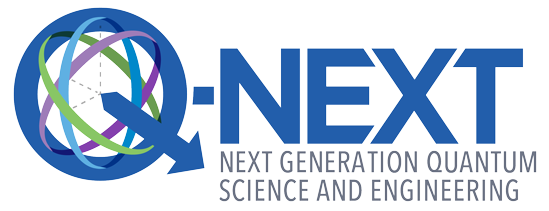In the News
-
Latest News Big Brains podcast: Why the quantum internet could change everything
From the University of Chicago: A world-renowned scientist explores quantum technology and why the future of quantum may be in Chicago. Read More
-
America's quantum future runs through Chicago
From Crain's Chicago Business: A new federal push promises to make the Windy City an essential hub and center of the nation’s advancing quantum capabilities. Read More
-
Argonne, Fermilab at forefront of ‘transformational’ quantum research
From WTTW: Quantum technology is expected to transform our world – from the creation of ultra-fast and powerful quantum computers, to sensors capable of detecting the movement of a single atom, to communication networks that can’t be hacked. Read More
-
Illinois picked to host two quantum information research centers
From Patch: The projects are led by Argonne National Laboratory and Fermi National Accelerator Laboratory in affiliation with the University of Chicago. Each project will receive $115 million in federal funding. The Illinois General Assembly also directed $200 million to be split equally between the University of Chicago and the University of Illinois to develop quantum infrastructure for the Chicago Quantum Exchange. Read More
-
U. of Chicago will host 2 of 5 national quantum research centers
From Connect: Illinois, and specifically Chicago, was chosen to host two of five new National Quantum Information Science Research Centers, including a center led by Argonne National Laboratory and a center led by Fermi National Accelerator Laboratory. Each is projected to receive $115 million in funding over the next five years, and both are affiliated with the University of Chicago. Read More
-
OSTP, NSF, DOE announce $1B investment to set up AI, quantum research hubs; Michael Kratsios quoted
The White House Office of Science and Technology Policy, Department of Energy and the National Science Foundation have announced that they will invest more than $1B to help build 12 research institutes focused on artificial intelligence and quantum information science. Read More
-
US to spend $625 million on super-computing research centers
From Terbaik News: The US on Wednesday said it will spend $625 million over the next five years on centers to research artificial intelligence and quantum computing. Read More
-
Gov. Pritzker announces federal support of quantum and artificial intelligence research in Illinois
From RiverBender.com: Today’s announcement builds on the progress Illinois has made to create an ecosystem to support groundbreaking advances in science and innovation. Read More
-
Illinois picked to host two quantum information research centers
From The Center Square: Illinois has been chosen to host two of the five new National Quantum Information Science Research Centers. Read More
-
Caltech faculty to advance future quantum science efforts
From Technology.org: The White House Office of Science and Technology Policy and the U.S. Department of Energy (DOE) have announced funding for five new quantum information science centers across the country, in support of the National Quantum Initiative. Read More
News and features
See all news and features-
Design rules and synthesis of quantum memory candidates
From the University of Illinois Urbana-Champaign: Researchers use density functional theory calculations to identify possible europium compounds to serve as a new quantum memory platform. They also synthesize one of the predicted compounds, a brand new, air-stable material that is a strong candidate for use… Read More
-
‘Ruler for light’ could enable detailed measurement in personal devices
Frequency combs have revolutionized precision measurement, but the bulky, power-hungry devices are limited to lab settings. A new efficient laser “microcomb” developed by Stanford researchers could bring that revolution to the handheld electronics realm. Read More
-
Resurrecting niobium for quantum science
For years, niobium was considered an underperformer when it came to superconducting qubits. Now scientists supported by Q-NEXT have found a way to engineer a high-performing niobium-based qubit and so take advantage of niobium’s superior qualities. Read More
-
Researchers from startups, government labs and academia develop new techniques for making qubits out of erbium
Argonne project addresses quantum technology challenges and highlight sthe versatility of a rare-earth metal used in lasers and to color glass. Read More
-
Meet Edward Schmitt, facilities engineer
Former Marine Corps electronics technician Edward Schmitt keeps the Argonne Quantum Foundry running while advocating for veterans. Read More
